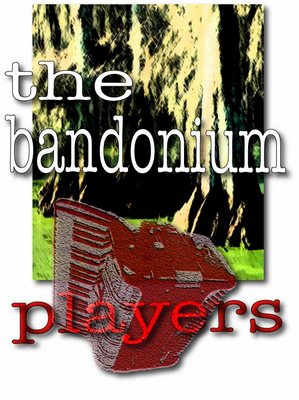The Bandonium Players (from The Songs Of The Erinnyes, Sonnets, Odes, and Elegies by Jay Noya, Brigantium Press)

1
Pink upon lilac and pink upon violet mother-of-pearl flowers
Inlaid throughout the instrument’s edges and corners
Erupting from the ends of stems
From twisting and curling vines
Starting nowhere and ending nowhere
Once a German instrument in most respects
If not entirely proper it was just the same familiar
And modest and jolly and accessible
It was familiar in the beer halls of Hamburg and Berlin
And it was a matter of time only
Before the Germans and their instrument
Traveled to South America where the music altered
Most conspicuously and where the Germanic sentiment
And intent and directions of style and rhythms
Slipped away as it had slipped away
From the beer halls back home and crossed the Atlantic
And in Argentina what was left evolved into the tango
It evolved into Mephistopheles’ own music
The Argentines went mad with the nostalgic lyrics
And the wailings and mutterings of Carlos Gardel
The guitars and the bandoniums and the cigarettes
And the cheap booze and the whores and the gangsters
Turned the atmosphere into delirium and desperation
The tango dancers and singers and musicians
Turned their gatherings into a refuge and limbo for the forsaken
For the nihilists and the addicted to hallucinations
And the liars and the cheaters and assassins for hire
With stiletto blades and revolvers in their coat pockets
And the addicted to chasing ghosts and ghouls and love
The mystery was the music worrying the heart and worrying the soul
It was the swirling and rubbing bodies moving in the dimness of backrooms
The tango came and went and was played in basements and salons
In theatres and bedrooms and bordellos of the Buenos Aires slums
Where an esprit de corps prevailed among whores and pimps
And drunks and customers with fats wallets and priests and gangsters
The bandonium as much as the singing and the guitars was the tango
The instruments did not differ from the women and the men
Who listened to it or played it or danced to it
And saw themselves in what they heard
The guitar notes slashed the silence to shreds
And the bandonium and the mandolin followed
And as in a phantasmagoria bodies shuffled across the dancing floor
There had to be and there was a flower in the tango garden
And the bandonium was the flower with the poisonous nectar
2
Marguerite and Raymond are Acadians living in Louisiana
Who play and sing and dance to Acadian music
They’ve been married for nineteen years and have two girls
The girls play guitars and fiddle and mandolin
And sing and dance to Acadian music
When they’re not playing and singing rock ‘nd roll
Or when they’re not playing and singing the blues
In a small room with two windows and two mirrors
And two small beds and one old table and two chairs
And shelves built up from the floor to the ceiling
And covering every inch of free wall space
Rose and Adele are twins but not identical
Their guitar playing and singing are similarly different
And Marguerite and Raymond can sometimes guess why
And other times they’re just glad to listen to the girls play
And listen to them sing and watch them dance
The girls’ room is up on the second storey of an old house
That went up no one knows when exactly
An old house with a veranda which has needed mending
But got none decades and decades
Before the Acadian family of musicians arrived
And took over the old house next to the Nartius
From an eighty-two year old woman named Laurel-Anne Evans
Who died one April day just minutes before noon
As the first daffodils showed their yellow flowers
Here was this old house less than one hundred yards away
From banks of the Nartius a place noisy and stirring with life
And color and fragrances and mysterious prospects
For the curious eye and the curious pair of eyes and feet
Moving across it and about it moving and investigating
Its narrowness and its solitude and its shadows
A place where the twilight stalked the stranger
And beguiled him with its whisperings and secrets
And beguiled him with its music of rills and reeds
Swaying in unseen and silent winds fetching up at the banks
A place where memories hampered one’s thinking
A place where memories hindered one’s sight and hearing
What one saw and heard and imagined and felt
Couldn’t be reconciled with one had seen or heard in the daytime
The Mississippi was splitting itself up
With every single tick of an unseen and unheard clock
Water moved in the dark and during the daytime
Water invaded and approached and otherwise accosted
And besieged and overwhelmed and erased and erected
New topographies seldom visited or noticed
New topographies that vanish one day when others replace them
It’s a place where meaning and consequence
Are the source of prayer and count only as payment or credit
For a lonely and forlorn person’s place
In another unknowable universe of light with its glorious boundaries
And topography of goodness and life everlasting
The Nartius is one of the thousand or more Mississippi tributaries
And puddles and creeks and nameless canals
It’s a place where the Mississippi knows it all
And claims it all and threatens it all
And where all types of history are but whimpers and rumors
It’s a world of water and wisteria and madness and darkness
Nevertheless there are days when the sun is foremost and primeval
When the sun is universal and tyrannical and permeates every corner
And insinuates itself into every thought and erects walls
And crowds queer and unfamiliar places with voices and faces
The lot of whom are strangers chattering away peculiarly
The Mississippi can usurp and alter and deprive of sense
And deprive of meaning and deprive of comfort and obligations
And turn one man’s and one’s woman’s life
Into an apotheosis and into a horror of absurd proportions
Into a nightmare of apocalyptic moments and wonder
As it drives its great and small bodies of water
Further inland and further east and west and down ravines
And lowlands and through forests and woods
And across meadows and over ridges and outcrops
And turns and bends twists out of sight and away in the distance
But the goal is the sea where it’ll release itself
And deposit its mysteries and histories
Along with the lives and deaths of everything mortal
3
After dinner Marguerite and Raymond and the girls
Two bandoniums and two guitars and voices
With plenty of finger thumping and feet stumping
Played and sung and danced up and down the veranda
Within hearing of the river Nartius
And under the intrusive density and well-like shadows
Of poplar and oaks and gum and willow trees
Their songs were about the Mississippi
They were songs about the living and dying of everything mortal
And when they were done singing secular songs
They turn to the Bible and they sang about immortality
They sang about living in sin and living in grace
They sang about ruin and perdition and great abominations
They sang about prayer and the capacity for forgiveness
They sang about the mystery of redemption
They sang about renunciation and terrible trespassing
They sang about repentance and humiliation and about striving
To reach the one place where the spirit welcomes the soul
And death isn’t a threat and isn’t a blemish
Upon the fate of all human thought and human endeavors
4
Marguerite and Raymond played bandoniums
And Rose and Adele played guitars and sang and danced
With plenty of finger thumping and feet stumping
They played and sang and danced up and down the veranda
© J. Noya, 2006






